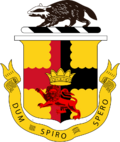Rajah of North Borneo: Difference between revisions
Jump to navigation
Jump to search
(Created page with "{{Infobox monarchy | royal_title = Rajah | realm = North Borneo | native_name = <!-- Optional. --> | border = <!-- Optional. Accepted va...") |
No edit summary |
||
| Line 30: | Line 30: | ||
| website = <!-- Optional. --> | | website = <!-- Optional. --> | ||
}} | }} | ||
The '''Rajah of North Borneo''' is the semi-constitutional monarch and head of state of [[Rajah of North Borneo|North Borneo]]. The office, which was established in 1953 by Leonard Brooke is a continuation of the previous {{wp|White Rajahs|White Rajah}} office established in 1842 by {{wp|James Brooke}}, a {{wp|British}} soldier and adventurist. | |||
The current Rajah is [[William Brooke]], whom ascended to the throne on May 21st 2004. He is the second Rajah of [[Raj of North Borneo|North Borneo]], and also the seventh overall monarch of the {{wp|White Rajahs|Brooke}} dynasty. | |||
The consort of the Rajah is known as The Ranee of [[Raj of North Borneo|North Borneo]], with the current Ranee being Sarah Young. They are respectively styled as "His Highness" and "Her Highness" themselves. | |||
Latest revision as of 14:10, 12 December 2021
| Rajah of North Borneo | |
|---|---|
 | |
| Incumbent | |
 | |
| William Brooke since 21 May 2004 | |
| Details | |
| Style | His Highness |
| Heir apparent | Michael, Rajah Muda of North Borneo |
| First monarch | Leonard Brooke |
| Formation | 11 July 1953 |
| Residence | Brooke Palace, Kuching |
The Rajah of North Borneo is the semi-constitutional monarch and head of state of North Borneo. The office, which was established in 1953 by Leonard Brooke is a continuation of the previous White Rajah office established in 1842 by James Brooke, a British soldier and adventurist.
The current Rajah is William Brooke, whom ascended to the throne on May 21st 2004. He is the second Rajah of North Borneo, and also the seventh overall monarch of the Brooke dynasty.
The consort of the Rajah is known as The Ranee of North Borneo, with the current Ranee being Sarah Young. They are respectively styled as "His Highness" and "Her Highness" themselves.